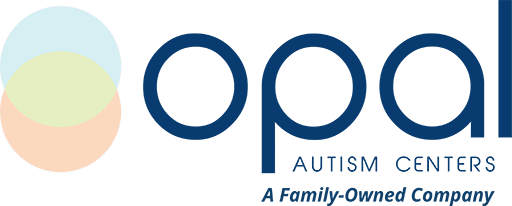Autism begins early in life, and early intervention can make all the difference. In fact, the earlier a child starts receiving treatment, the better their chances for success. Opal Autism Centers can help determine if your child can benefit from early intervention.
Autism spectrum disorder (ASD) is a complex neurological and developmental disorder that affects how someone acts, learns, and interacts with others.
Symptoms of autism can vary from one person to the next. In fact, many say, “Once you’ve met one person with autism, you’ve met one person with autism.” In other words, the condition affects everyone a little differently. The name “autism spectrum disorder” reflects these wide variations in autism.
Signs and symptoms of autism may change with age. Many children with autism first show signs between the ages of 12 and 18 months or even earlier. These early signs include:
- Problems making or maintaining eye contact
- Not responding to their name
- Trouble following another person’s gaze or looking where the other person is pointing to
- Poor skills during pretend play and imitation
- Problems with nonverbal communication, such as not smiling back when someone smiles at them
Research shows that early diagnosis of autism and early interventions for autism can have major long-term positive effects on symptoms and skills later in life.
Healthcare professionals can sometimes diagnose ASD in children under the age of 2. Some children with autism can have normal development for the first two years of life before showing signs of ASD, sometime during or after the age of 2.
Early interventions can start as early as 2 or 3 years of age, during your child’s preschool years. At this age, a young child’s brain is still forming, which means their brain is more changeable or “plastic” than when they are older. As a result of this plasticity, early treatments are often more effective. Early interventions also give your child the best chance of developing to their fullest potential.
The American Academy of Pediatrics (AAP) recommends that all children undergo screening for ASD at 18 and 24 months, along with other developmental screening tests. AAP also recommends that early intervention should start as soon as a healthcare professional suspects autism rather than waiting for a diagnosis.
Opal Autism Centers Provide Early Intervention for Autism
Autism can affect learning.
People with autism often have trouble with social skills, difficulty processing information, higher levels of anxiety, and challenges communicating.
During the first two years of life, children learn essential skills, such as:
- Physical (motor) skills – throwing and kicking balls, eating with a spoon, scribbling with crayons, building with blocks
- Thinking (cognitive) skills – holding something in one hand while using the other, using switches or knobs, playing with more than one toy at a time
- Communication skills – saying more than two words together, pointing to things when asked, nodding yes or smiling back
- Social skills – making eye contact, noticing when someone is hurt or upset
- Emotional skills – expresses affection openly, ability to recognize feelings of happiness and sadness
While these skills may seem unimportant, they are the building blocks for your child’s physical, emotional, social, and cognitive development. Autism can delay the development of these skills, which could put your child behind.
Early intervention can help. In fact, some children progress so much after early intervention that they are no longer on the spectrum when they get older. Many of these children have some things in common, such as:
- Diagnosis and treatment at younger ages
- A higher IQ than the average for a child with autism
- Better language and motor skills
Early Intervention with Opal Autism Centers
Early diagnosis and intervention with Opal Autism Centers can make a big difference in your child’s life. Applied Behavior Analysis (ABA) therapy is an important and effective therapy for many children with autism. ABA breaks down tasks into smaller, more manageable steps. It also helps children with autism learn new skills by reinforcing desirable behaviors.
ABA relies mainly on positive reinforcement to change behaviors associated with autism. Positive reinforcement works on the principle that if someone is rewarded for a behavior, they will repeat it. Rewarding positive behavior with praise, a toy or book, a trip to the playground, or other rewards will encourage the child to continue using a skill.
The goal of ABA is to increase helpful behaviors and to decrease harmful behaviors or that negatively affect a child’s learning. ABA therapy programs can help:
- Increase a child’s language and communication skills
- Improve a child’s attention, memory, social skills, focus, and academics
- Decrease problem behavior
Researchers have been studying ABA for decades, and people of all ages and walks of life have used ABA to gain a wide variety of skills. Therapists have been using ABA to help children with ASD and related disorders since the 1960s.
Depending on a child’s needs, early intervention programs may also include:
- Family training
- Speech therapy
- Hearing impairment services
- Physical therapy
- Nutrition services
At Opal Autism Centers, we encourage parents to set goals for their children and help them achieve them. Early intervention at Opal helps children regain those basic skills they usually learn before their second birthday.
For more information about the power of early intervention for children suspected of having autism, consult with Opal Autism Centers. The sooner your child starts therapy with Opal, the more likely they are to enjoy their full potential later in life.

